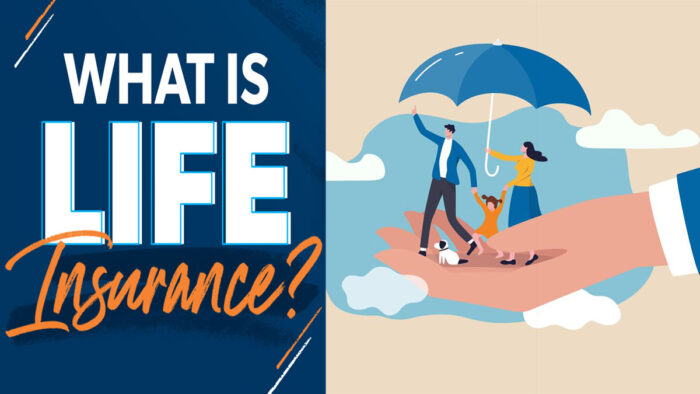Life is beautiful, and it is important that we live it to the fullest. Nobody knows what will happen in years to come. This is why you need to get life insurance to secure your future and that of your loved ones.

While enjoying your life, remember to set some money aside to buy a life insurance policy. With life insurance, you will certainly have peace of mind. When you are no longer alive, your children or loved ones will benefit from the investment you have made for them.
The essence of buying this insurance policy is that when you are no longer alive, your beneficiaries will be paid a sum of money.
In a situation where you are the breadwinner of your family, this money can sustain your children or loved ones for a while. However, for it to be effective, the policyholder has to pay a single premium upfront or pay regular premiums over time.
What is Life Insurance?
Life insurance is a contractual agreement between an individual and an insurance company in which the insured person pays regular premiums, and in return, the insurer provides a financial benefit to designated beneficiaries upon the death of the insured.
This benefit, known as the death benefit, is typically a lump sum payment and is intended to provide financial support to the beneficiaries, such as family members or dependents, in the event of the insured’s death.
Who Needs Life Insurance?
It is essential for people who are breadwinners. If you are the breadwinner of your family and everyone depends on you financially, then you need to purchase a life insurance policy. Also, it is important for parents, homeowners, or someone with co-signed debt.
The money you get from your beneficiaries can be used for anything. It can be used to replace your income, cover your funeral and burial costs, or repay debts.
How Much Does a Life Insurance Policy Cost?
The cost of a life insurance policy depends on a few factors. Some of the factors that determine the cost include age, health, gender, policy add-ons, and the life insurer.
Life insurance companies do not reveal the average rates. So it is important that you choose an insurer based on what they can offer and the product you need, rather than the rate.
How Does Life Insurance Work?
It is very simple. Once you purchase a life insurance policy, you are simply making an agreement with an insurance company. This agreement is to make regular payments toward continued coverage with the policy.
You will choose a beneficiary, which can be your children, spouse, or family member. So that once you pass away, the insurance company will pay your beneficiary some amount of money.
However, before your beneficiary can access the money, they need to file a claim with the company. The insurance company will process the claim before making payments to your beneficiaries.
What Does Life Insurance Cover?
Depending on the type of policy you have, it can cover the following:.
• War or Terrorism
It may cover deaths caused by war or terrorism. However, it is good to check for coverage before you purchase this insurance policy.
• Natural Deaths
Deaths caused by old age, disease, or heart attacks can be categorized as natural deaths. So it will cover deaths caused by any of the mentioned ailments.
• Homicide
Your insurance policy covers homicide. But how the insurer dies can affect the payout. For instance, if it was a beneficiary who murdered the insurer, then that beneficiary would not receive the payout.
• Illness or Injuries
Most life insurance companies offer coverage for illnesses. This is usually covered when you are alive. For instance, a critical illness rider covers conditions like cancer and any condition that stops you from going about your daily activities.
• Accidental Deaths
Accidental deaths caused by drowning, poisoning, or car crashes are usually covered as well.
What Does It Not Cover?
Your insurance policy does not cover the following:
• Misrepresentation
Your insurance policy doesn’t cover misrepresentation. Any lie detected by the insurance company will make them cancel your policy. So when applying for this insurance policy, you have to be 100% transparent.
• Criminal Activities
If you died as a result of a crime you committed, your beneficiaries will not receive any death benefit. Activities like drug abuse and alcohol, which can lead to your death, will not be covered.
• High-Risk Hobbies
Having a high-risk hobby that can eventually lead to your death will not be covered. For instance, if you die as a result of skydiving, your beneficiaries will not receive any payouts.
How Do I Get a Life Insurance Quote?
It is very easy to get a quote. But first, you have to think about how much coverage you need and what policy is best for you.
You can do thorough research on this, after which you can work with any licensed insurance agent. Once you have chosen your coverage amount and policy type, you can go ahead and purchase a life insurance quote.
FAQs
At What Age Should I Get Life Insurance?
Everyone has a certain age that is right for them. It is better to start your policy when you are younger. The younger you start your policy, the cheaper it is.
Do You Pay Taxes on Life Insurance?
Well, this depends on your insurance policy. Under normal circumstances, your beneficiary does not have to pay tax on a life insurance death benefit. The only time you have to pay any income tax is if you cash out the policy completely and end up with more money than you paid throughout your policy.
Can I Buy Life Insurance From Someone Else?
Yes, you can buy it from someone else. You can purchase from someone else as long as you can prove an insurable interest. This means that if that person dies, you will suffer financially. Note: You cannot purchase a policy from someone else without their knowledge.
Can I Use My Life Insurance While Still Living?
There are ways you can use your life insurance while still living. But this can be done if you have a cash-value life insurance policy. However, you can only access the cash value by surrendering the policy or through withdrawals or loans.



